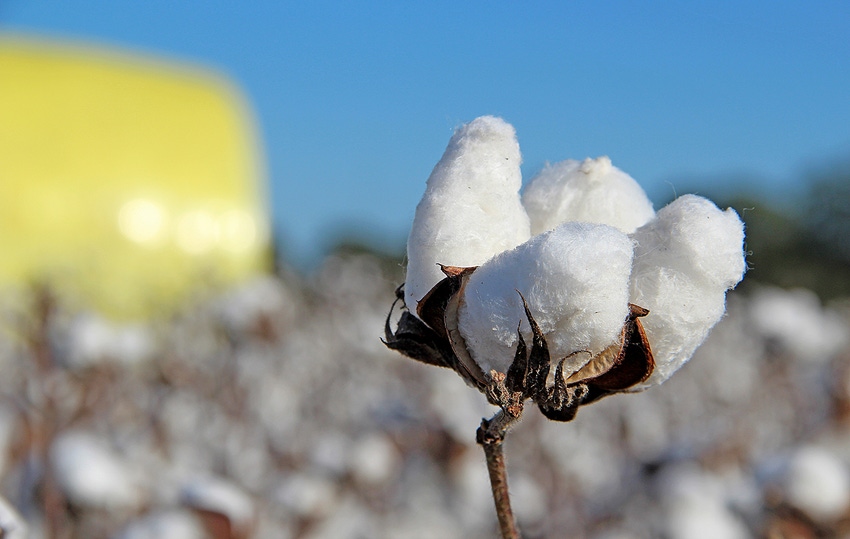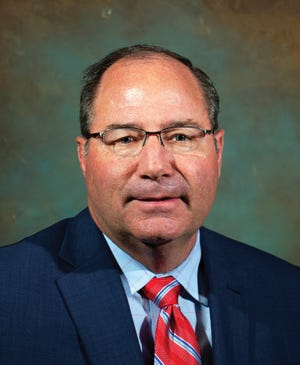
The National Cotton Council (NCC) has been focused on many issues this year, but the main three are – maintaining cotton's viability during the pandemic, ensuring that American cotton remains contamination-free and supporting cotton's message of sustainability, according to NCC's chairman, Kent Fountain.
"We've been working so hard to get CFAP (Coronavirus Food Assistance Program) and MFP (Market Facilitation Program) payments in place," Fountain said. "And, trying to keep people viable with the reduction of offtake and demand that happened through COVID."

Kent Fountain, Chairman, National Cotton Council of America. (Photo credit: National Cotton Council)
Working on the legislative side, NCC has been able to help get two CFAP payments and two MFP payments to growers, as well as monitoring demand and the impacts of COVID-19. They continue to work with the manufacturing and merchant side of the industry, in addition to the ginning, cooperative, cottonseed and warehouse segments of the industry.
"We have a three-pronged approach to work with producers, manufacturers and the merchandising communities," Fountain said.
In addition to the CFAP and MFP payments, NCC is currently asking that supplemental economic assistance payments to manufacturers be set at six cents a pound considering that when the pandemic hit and manufacturers shut down, no cotton was being used, thus making a hardship for those manufacturers. They are also asking for loan redemption credits for cotton merchants who had to hold cotton in warehouses when the manufacturers were not using cotton.
"Domestic manufacturers have really been impacted very badly during the pandemic," Fountain said. "They went from doing pretty well, to doing nothing."
He noted that had it not been for a shift to the production of Personal Protection Equipment, all cotton manufacturing would have been shut down in the U.S.
Trust Protocol
These activities mean a lot to the industry in the short term, but Fountain mentioned that the new U.S. Cotton Trust Protocol will have a larger influence on the cotton industry.
"We've got to be sure that we are the growth that the manufacturers buy first," he said. "This is one tool to be able to do that and it's a big tool."
The U.S. Cotton Trust Protocol is a verification process for U.S.-grown cotton, that ensures and communicates to the buyer that it is from a sustainable source.
"The U.S. Cotton Trust Protocol is more than telling our story," he said. "Everyone knows it, but now the retailers can verify it. We know and I think they know that U.S. cotton is the most sustainable in the world, but our customers want it verified."
He said that getting growers signed up and following through with the protocol is important to telling the story of U.S. cotton and keeping 16 to 17 million bales moving into the world market each year.
Controling Contamination
Keeping cotton contamination-free is also important to the movement of cotton into the market. Keeping U.S. cotton contamination-free will ensure that fiber grown in the U.S. is the best cotton to source, according to Fountain.
NCC has produced education videos detailing how to keep plastics out of the harvest and ginning process. They also emphasize in grower and ginner meetings that contamination prevention starts before cotton is harvested or ginned for best results.
They have also worked with John Deere and module packaging manufacturer, Tama, to help stop plastic from getting into the gin.
A system developed initially by USDA and sold by Lummus uses and air knife to remove plastic contamination from the ginning process.
"It's a camera system that goes over the aprons of the gin stand," Fountain said. "It uses the air knives to shoot any colored plastic to the floor of the gin.
"We've finally got the first commercial detection and ejection system available. We're hoping and praying to get more."
He mentioned a few of the things he has pulled out of his gin with the system including marker flags, balloons and even a whole Dasani water bottle.
"We are currently working on specifications on module wrap so companies can make the wrap to those specifications," he said. "What we don’t want is for people to come in making wrap that does not work for the industry."
Like other ag organizations, the NCC is working to ensure that the results of the recent election will not affect the industry in a detrimental way. It is also keeping an eye on what the pandemic has done to the market, including working with Cotton Council International and Cotton Incorporated to see how they can help move cotton in the market.
"I do want to make sure everyone in the industry knows just how well the staff has worked through the Covid situation," Fountain said. "One thing we did learn was how we could, as an organization, figure out how to work through the pandemic."
He said staff has done an excellent job with the advancement of the organization's objectives.
"The mid-year board meeting was virtual and 98% of the board attended, which is phenomenal," he said. "We've figured out we can adapt and still get the results for our industry."
The annual meeting of the NCC, will also be held virtually in February. It will be important for the industry to establish plans and priorities as the organization moves forward to the next year.
About the Author(s)
You May Also Like






